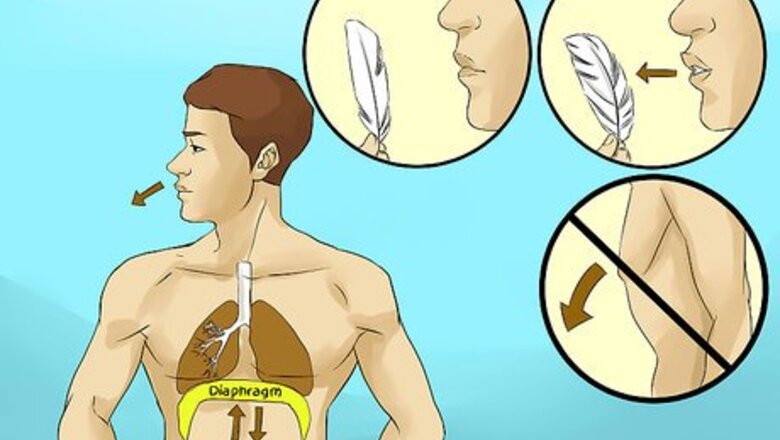
views
Strengthening Your Breathing
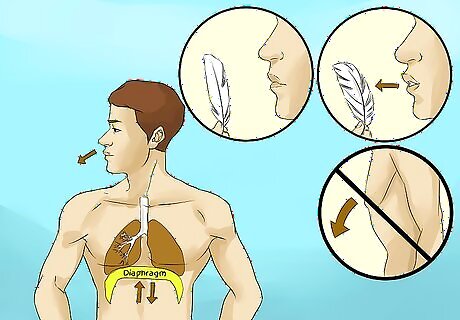
Learn to control your breathing. The most important skill to master in singing and dancing at the same time is becoming a pro at controlled breathing. You want to be able to have a sustained and smooth exhale for long notes and slow phrases. The goal is to learn how to breathe from your diaphragm, which means you will learn to breathe more deeply to avoid airy singing. Here is an exercise to try: Hold a feather in front of your mouth as you breathe so that you move the feather. You want a steady stream of breathe that is long and controlled. Continue blowing the feather. Be aware of your body as you exhale, and keep your chest from collapsing. Do not inhale until you are completely out of air and feel the immediate urge for more air. Keep practicing this exercise, each time trying to blow the feather for longer periods of time.
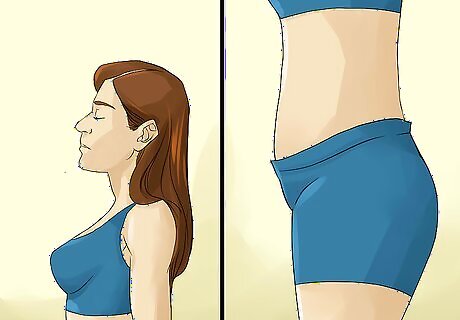
Take deep breaths. Singing and dancing both require a lot of air, and you need to learn how to breathe from your lower back and belly to achieve a roundness in your breathing. If you take shallow breaths from your chest, you will not sound as good. For deeper breaths, try plank exercises by laying on your front side, and lifting your legs and shoulders up off the ground. As you do this, take slow, deep breaths. This will strengthen your breathing. Yoga classes are a great way to learn to breathe deeply and strengthen your muscles.
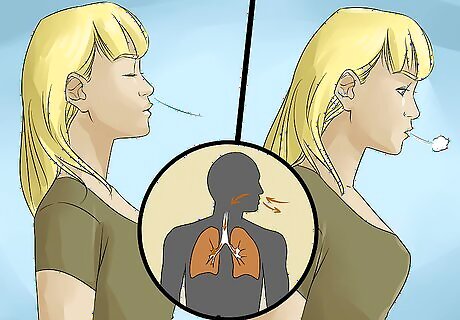
Feel yourself inhale and exhale. Inhaling is when breath enters your lungs, and exhaling is when breath leaves. You have to learn how to exhale and inhale quickly and deeply because the music will not wait for you to catch up. Before strengthening your breathing technique, it is important for you to feel your breaths, and be aware of what your body is doing when you take deep breaths. Here are some exercises to help you become more in-tuned: Visualize the air weighing 50 pounds as you take a deep breath, and imagine the air falling low into your body. Think about it slowly falling below your belly button, and really focus on the sensation. Then, slowly exhale. Inhale again, but a little faster. Continue to imagine the air being heavy and falling deeply, but allow yourself to visualize it faster than before. You should feel your abdomen and lower back expand as you take in air. Then, exhale the air a little faster than before.
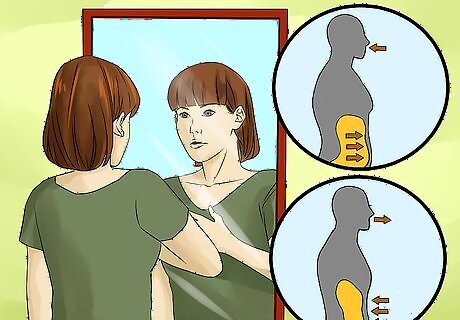
Watch yourself in a mirror to check your breaths. If you have doubts about how deeply you are breathing, you may find your answer by watching how your external body changes while you are breathing. If you are taking deep breaths, you should see your diaphragm release, and your gut expand. If your body is not changing on the outside, you are not taking deep enough breaths. During breathing exercises, rest one hand on your chest and the other hand on your abdomen. Use one hand to make sure your chest is steady as you breathe, and the other to feel your abdomen expand and release. This will help you to feel if you are breathing deeply enough.
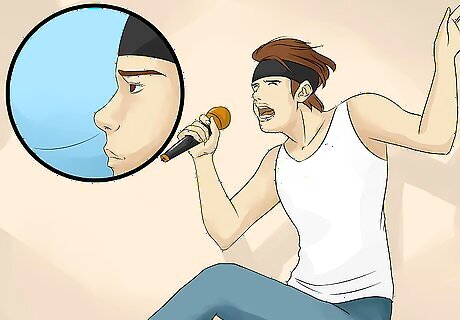
Stagger your breaths. With certain dance routines that are high energy and extra challenging, you may need to stagger your breaths to make it through the song. This means that you need to take short breaths at strategic places during the song. While practicing the song with the dance, plan out when you will take your breaths by finding breaks in the music. By planning out your breathing, you can more easily make it through the song without running short of air. If you know a long note in the song is coming up, make sure you find a place in the dance where you can pause, and take a long, deep breath.
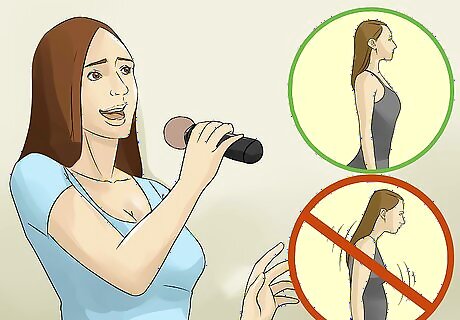
Practice good posture. Efficient breathing is more than just learning to exhale and inhale. Your posture needs to work with your breathing in order to improve your singing and make taking a deep, full breath easier. If you allow your body to slouch over, your diaphragm will lock and keep you from taking proper breaths for singing. Always keep your shoulders back, and stand straight to allow your chest and ribs to expand for deep breaths.
Preparing Your Body to Move and Sing
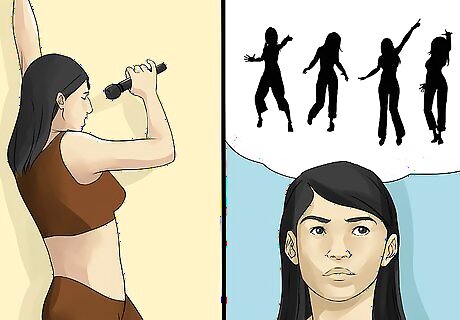
Practice singing and dancing together. Most things are hard at first, and they require hard work to master. Do not try mastering singing and dancing separately before you bring them together. You should be practicing for what you ultimately want to achieve, which is singing and dancing at the same time. Practice three to five days a week for two hours at a time. Your two hour workout should include about twenty minutes of stretching and vocal warm-ups. Just remember, the more you practice, the better you will get. Practice singing and dancing together until you feel you could do it in your sleep, and then keep practicing. Get the choreography into your muscle memory. You should practice the dance so much that you do not even have to think about the moves as you are dancing and singing. You want your muscle memory to kick-in so you can effortlessly perform the moves.
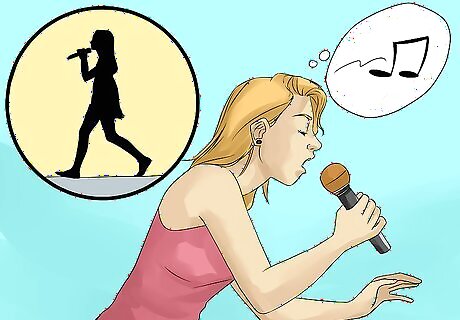
Match your singing to the moves. As you are learning the choreography, simply say the lyrics of the song as you move. This will allow you to see how the music and moves fit together. Usually, certain dance movements are catered to fit certain musical phrases to help you make connections to the vocals. Notice these parts to help guide you through the song and dance. Try singing while simply walking around a room, or doing chores. This will help your body become used to spatial awareness when you are singing.
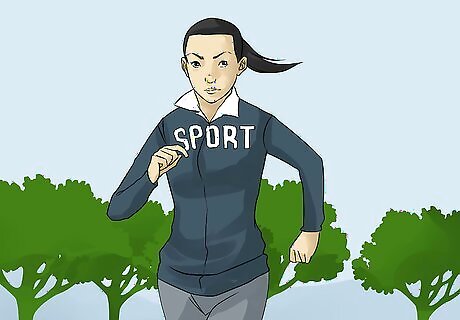
Start a rigorous fitness regime to increase stamina. Singing and dancing simultaneously requires lungs that are at their best fitness. In order to achieve optimal lung capacity, you have to train your lungs through high-level cardio workouts at least three times a week. Whether you run, jog, ride a bike, or swim, do something that increases your heart rate. Try to make each workout last at least one hour long.
Tracking Your Progress
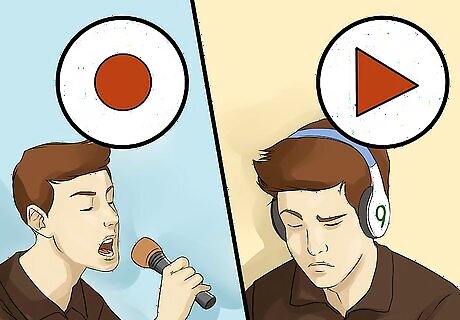
Record yourself. One of the best ways to analyze your voice, and check your progress, is to listen to recordings of yourself singing while dancing. You can focus on your voice, and compare your recordings as you go. Critiquing yourself will allow you to pinpoint where you need to improve so you can get better.
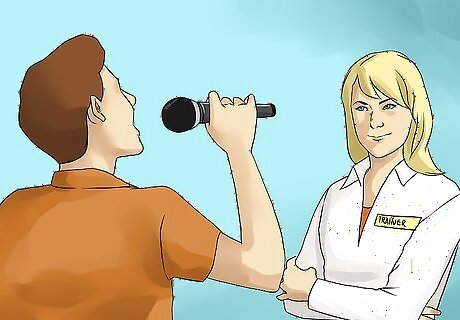
Get feedback from another person. It can be hard to critique your own singing or dancing when you are performing. It may be helpful to find someone willing to watch you practice so that they can provide you with helpful feedback or advice. Ideally, you will want to find a vocal coach or someone who is trained in singing and dancing, but if you don't know a professional, ask a friend or family member for their input.
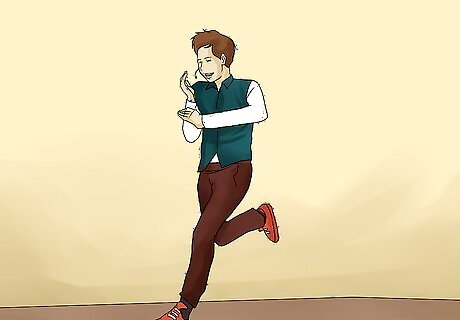
Increase the difficulty of the songs and dances as you practice. Once you master beginner songs and dances, or any song and dance you have been working on, challenge yourself with something more difficult. Once you see yourself completing song and dance numbers that are more difficult, you can feel confident that you are becoming better.




















Comments
0 comment